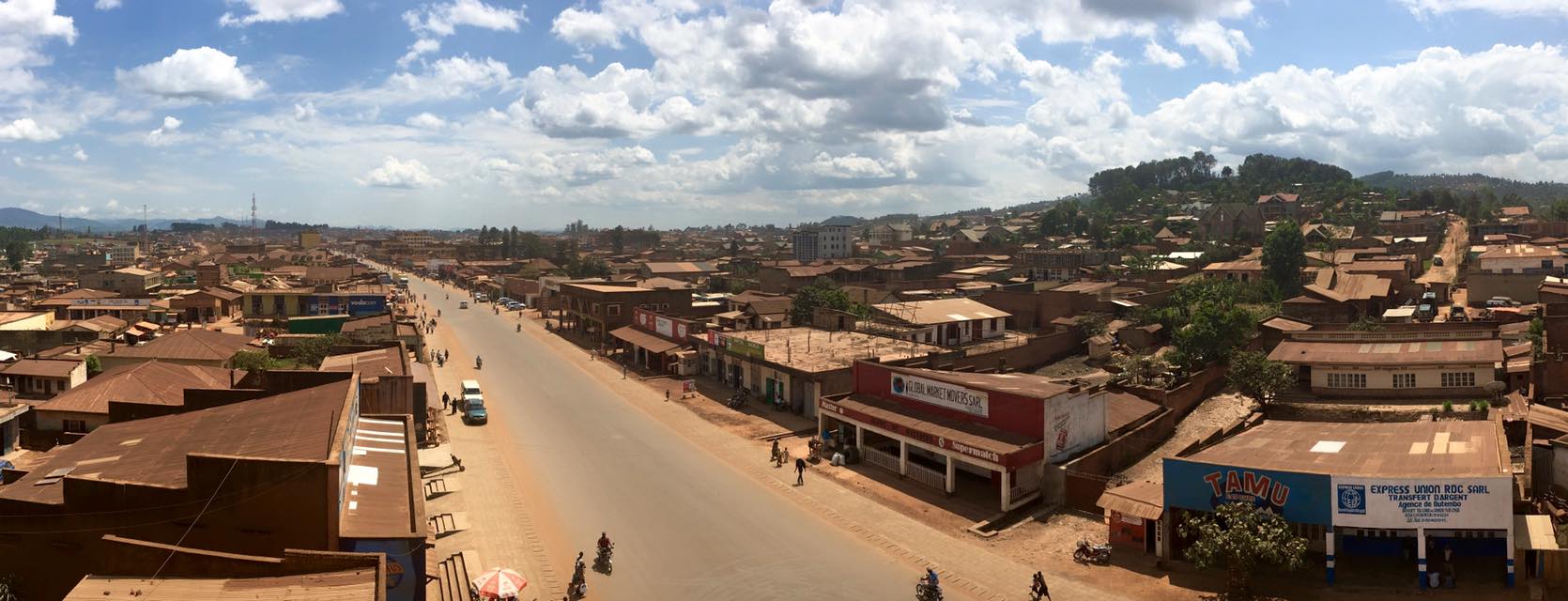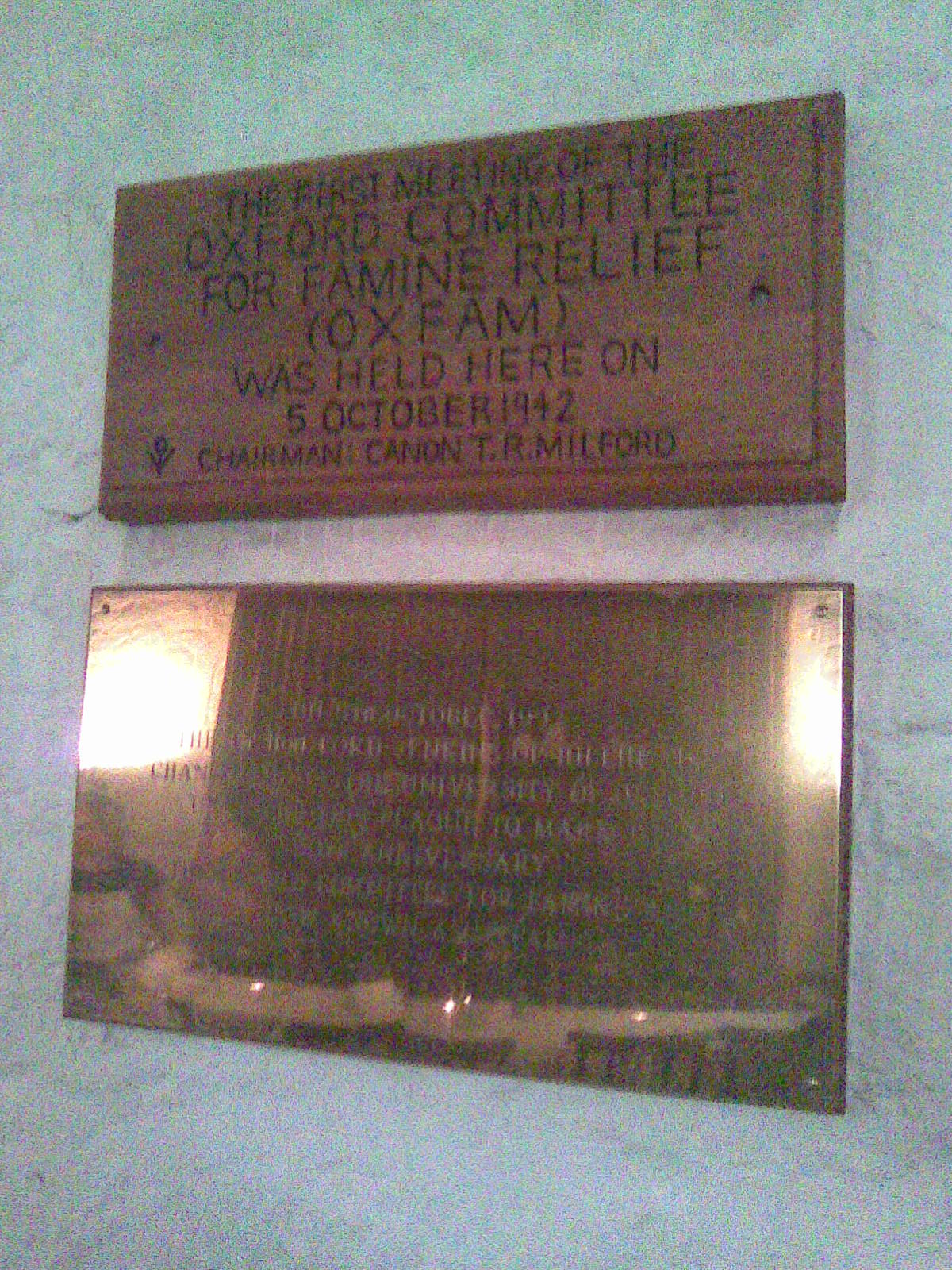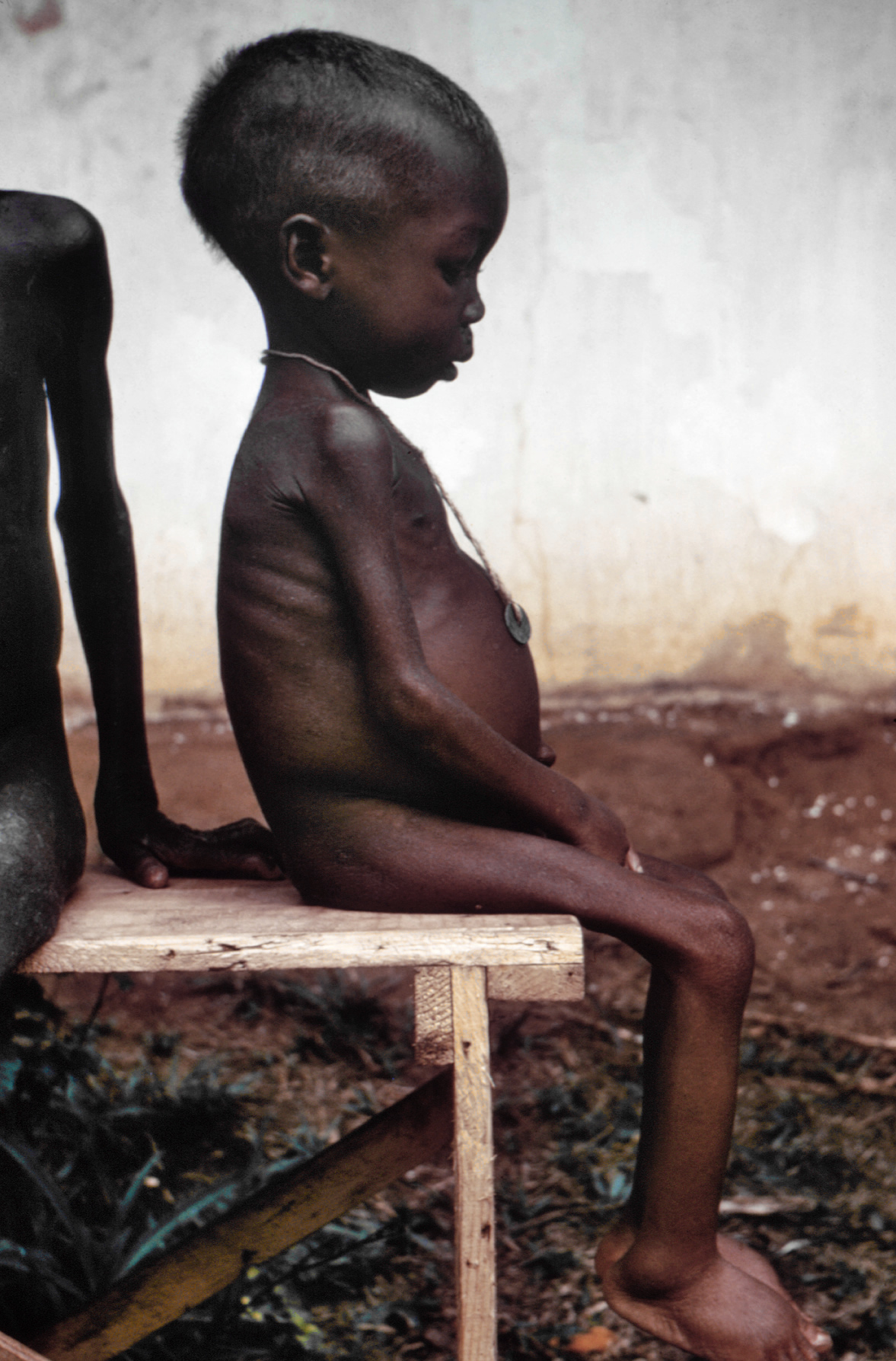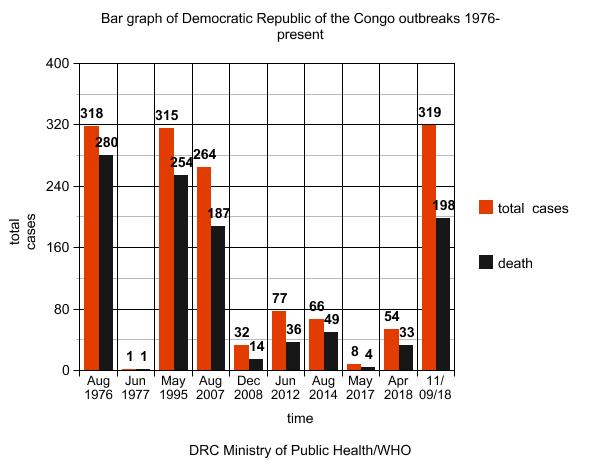|
Kivu Ebola Epidemic
The Kivu Ebola epidemic was an outbreak of Ebola virus disease (EVD) that ravaged the eastern Democratic Republic of the Congo (DRC) in Central Africa from 2018 to 2020. Between 1 August 2018 and 25 June 2020 it resulted in 3,470 reported cases. The Kivu outbreak also affected Ituri Province, whose first case was confirmed on 13 August 2018. In November 2018, the outbreak became the biggest Ebola outbreak in the DRC's history, and had become the second-largest Ebola outbreak in recorded history worldwide, behind only the 2013–2016 Western Africa epidemic. In June 2019, the virus reached Uganda, having infected a 5-year-old Congolese boy who entered Uganda with his family, but was contained. A military conflict in the region that had begun in January 2015 hindered treatment and prevention efforts. The World Health Organization (WHO) described the combination of military conflict and civilian distress as a potential "perfect storm" that could lead to a rapid worsening of t ... [...More Info...] [...Related Items...] OR: [Wikipedia] [Google] [Baidu] |
Democratic Republic Of The Congo
The Democratic Republic of the Congo (french: République démocratique du Congo (RDC), colloquially "La RDC" ), informally Congo-Kinshasa, DR Congo, the DRC, the DROC, or the Congo, and formerly and also colloquially Zaire, is a country in Central Africa. It is bordered to the northwest by the Republic of the Congo, to the north by the Central African Republic, to the northeast by South Sudan, to the east by Uganda, Rwanda, and Burundi, and by Tanzania (across Lake Tanganyika), to the south and southeast by Zambia, to the southwest by Angola, and to the west by the South Atlantic Ocean and the Cabinda exclave of Angola. By area, it is the second-largest country in Africa and the 11th-largest in the world. With a population of around 108 million, the Democratic Republic of the Congo is the most populous officially Francophone country in the world. The national capital and largest city is Kinshasa, which is also the nation's economic center. Centered on the Cong ... [...More Info...] [...Related Items...] OR: [Wikipedia] [Google] [Baidu] |
Center For Infectious Disease Research And Policy
The Center for Infectious Disease Research and Policy (CIDRAP) is a center within the University of Minnesota that focuses on addressing public health preparedness and emerging infectious disease response. It was founded in 2001 by Dr. Michael Osterholm, in order to "prevent illness and death from infectious diseases through epidemiological research and rapid translation of scientific information into real-world practical applications and solutions". It is not part of the Center for Disease Control or National Institute of Health. History Michael Osterholm founded Center for Infectious Disease Research and Policy (CIDRAP) in 2001. In 2019, the CIDR (Center for Infectious Disease Research in Seattle) was absorbed by the Seattle Children's Research Institute but the CIDRAP is not the same organization. Primary activities News publishing CIDRAP's news publishing division writes news stories and maintains information on influenza, bioterrorism, and new hot topics. The CIDRAP n ... [...More Info...] [...Related Items...] OR: [Wikipedia] [Google] [Baidu] |
Butembo
Butembo is a city in North Kivu, in the north eastern Democratic Republic of Congo, lying west of the Virunga National Park. The city is an important commercial centre with large markets, a cathedral, multiple large hospitals, and an airport. The city is located in a region known for tea and coffee growing. As of 2013 it had an estimated population of 670,285, making it the second largest city in North Kivu. Overview Butembo is 90% populated by the Nande tribe, a community distinguished by ethnic solidarity, conservative moral standards and influential leaders. The city is home to the 2nd Integrated Brigade of the Armed Forces of the Democratic Republic of the Congo, the Institut Kambali, founded in 1959, the (UCG), founded in 1989, and the Adventist University of Lukanga The Adventist University of Lukanga is known officially in French as L'Université Adventiste de Lukanga and abbreviated as UNILUK is an institution of higher education in Butembo, Nord Kivu, the Democrati ... [...More Info...] [...Related Items...] OR: [Wikipedia] [Google] [Baidu] |
Beni, Democratic Republic Of The Congo
Beni is a city in north eastern Democratic Republic of the Congo, lying immediately west of the Virunga National Park and the Rwenzori Mountains, on the edge of the Ituri Forest. Overview Beni is home to a market, an airport and the Christian Bilingual University of Congo (UCBC). As of 2013 it had an estimated population of 231,952. Beni contains four ''communes'', or municipalities: Beni, Bungulu, Ruwenzori and Mulekera. The town was the scene of fierce fighting in the Second Congo War around 2001. Beni also has many MONUC bases; elements of the Indian-led North Kivu Brigade are based in the town. Between October 2014 and May 2016 over 500 people died in a series of attacks on Beni and its surrounding area that have been attributed to Ugandan Islamist rebels. The Beni massacre occurred here in August 2016. As of December 2018 Beni has been subject to over 200 cases of Ebola virus disease (EVD) according to the World Health Organization. Beni is near Mangina, the epicenter ... [...More Info...] [...Related Items...] OR: [Wikipedia] [Google] [Baidu] |
Oxfam
Oxfam is a British-founded confederation of 21 independent charitable organizations focusing on the alleviation of global poverty, founded in 1942 and led by Oxfam International. History Founded at 17 Broad Street, Oxford, as the Oxford Committee for Famine Relief by a group of Quakers, social activists, and Oxford academics in 1942 and registered in accordance with UK law in 1943, the original committee was a group of concerned citizens, including Henry Gillett (a prominent local Quaker), Theodore Richard Milford, Gilbert Murray and his wife Mary, Cecil Jackson-Cole, and Alan Pim. The committee met in the Old Library of University Church of St Mary the Virgin, Oxford, for the first time in 1942, and its aim was to help starving citizens of occupied Greece, a famine caused by the Axis occupation of Greece and Allied naval blockades and to persuade the British government to allow food relief through the blockade. The Oxford committee was one of several local committees for ... [...More Info...] [...Related Items...] OR: [Wikipedia] [Google] [Baidu] |
Médecins Sans Frontières
(MSF; pronounced ), also known as Doctors Without Borders, is a humanitarian medical non-governmental organisation (NGO) or charity of French origin known for its projects in conflict zones and in countries affected by endemic diseases. Main areas of work include diabetes, drug-resistant infections, HIV/AIDS, hepatitis C, tropical and neglected diseases, tuberculosis, vaccines and COVID-19. In 2019, the charity was active in 70 countries with over 35,000 personnel; mostly local doctors, nurses and other medical professionals, logistical experts, water and sanitation engineers, and administrators. Private donors provide about 90% of the organisation's funding, while corporate donations provide the rest, giving MSF an annual budget of approximately US$1.63 billion. MSF was founded in 1971, in the aftermath of the Biafran famine of the Nigerian Civil War, by a small group of French doctors and journalists who sought to expand accessibility to medical care across nation ... [...More Info...] [...Related Items...] OR: [Wikipedia] [Google] [Baidu] |
2018 Équateur Province Democratic Republic Of The Congo Ebola Virus Outbreak
Eighteen or 18 may refer to: * 18 (number), the natural number following 17 and preceding 19 * one of the years 18 BC, AD 18, 1918, 2018 Film, television and entertainment * ''18'' (film), a 1993 Taiwanese experimental film based on the short story ''God's Dice'' * ''Eighteen'' (film), a 2005 Canadian dramatic feature film * 18 (British Board of Film Classification), a film rating in the United Kingdom, also used in Ireland by the Irish Film Classification Office * 18 (''Dragon Ball''), a character in the ''Dragon Ball'' franchise * "Eighteen", a 2006 episode of the animated television series ''12 oz. Mouse'' Music Albums * ''18'' (Moby album), 2002 * ''18'' (Nana Kitade album), 2005 * '' 18...'', 2009 debut album by G.E.M. Songs * "18" (5 Seconds of Summer song), from their 2014 eponymous debut album * "18" (One Direction song), from their 2014 studio album ''Four'' * "18", by Anarbor from their 2013 studio album '' Burnout'' * "I'm Eighteen", by Alice Cooper commonly r ... [...More Info...] [...Related Items...] OR: [Wikipedia] [Google] [Baidu] |
Index Case
The index case or patient zero is the first documented patient in a disease epidemic within a population, or the first documented patient included in an epidemiological study. It can also refer to the first case of a condition or syndrome (not necessarily contagious) to be described in the medical literature, whether or not the patient is thought to be the first person affected. An index case can achieve the status of a "classic" case study in the literature, as did Phineas Gage, the first known person to exhibit a definitive personality change as a result of a brain injury. Term The index case may or may not indicate the source of the disease, the possible spread, or which reservoir holds the disease in between outbreaks, but may bring awareness of an emerging outbreak. Earlier cases may or may not be found and are labeled primary or coprimary, secondary, tertiary, etc. The term primary case can only apply to infectious diseases that spread from human to human, and refers to t ... [...More Info...] [...Related Items...] OR: [Wikipedia] [Google] [Baidu] |
Kinshasa
Kinshasa (; ; ln, Kinsásá), formerly Léopoldville ( nl, Leopoldstad), is the capital and largest city of the Democratic Republic of the Congo. Once a site of fishing and trading villages situated along the Congo River, Kinshasa is now one of the world's fastest growing megacities. The city of Kinshasa is also one of the DRC's 26 provinces. Because the administrative boundaries of the city-province cover a vast area, over 90 percent of the city-province's land is rural in nature, and the urban area occupies a small but expanding section on the western side. Kinshasa is Africa's third-largest metropolitan area after Cairo and Lagos. It is also the world's largest nominally Francophone urban area, with French being the language of government, education, media, public services and high-end commerce in the city, while Lingala is used as a ''lingua franca'' in the street. Kinshasa hosted the 14th Francophonie Summit in October 2012. Residents of Kinshasa are known as ''Kinoi ... [...More Info...] [...Related Items...] OR: [Wikipedia] [Google] [Baidu] |
Hemorrhagic Fever
Viral hemorrhagic fevers (VHFs) are a diverse group of animal and human illnesses in which fever and hemorrhage are caused by a viral infection. VHFs may be caused by five distinct families of RNA viruses: the families '' Filoviridae'', '' Flaviviridae'', '' Rhabdoviridae'', and several member families of the '' Bunyavirales'' order such as '' Arenaviridae'', and '' Hantaviridae''. All types of VHF are characterized by fever and bleeding disorders and all can progress to high fever, shock and death in many cases. Some of the VHF agents cause relatively mild illnesses, such as the Scandinavian '' nephropathia epidemica'' (a hantavirus), while others, such as Ebola virus, can cause severe, life-threatening disease. Signs and symptoms Signs and symptoms of VHFs include (by definition) fever and bleeding: * Flushing of the face and chest, small red or purple spots (petechiae), bleeding, swelling caused by edema, low blood pressure ( hypotension), and circulatory shock. * Mala ... [...More Info...] [...Related Items...] OR: [Wikipedia] [Google] [Baidu] |
DRC Cases South And North Kivu , Ituri
The Democratic Republic of the Congo (french: République démocratique du Congo (RDC), colloquially "La RDC" ), informally Congo-Kinshasa, DR Congo, the DRC, the DROC, or the Congo, and formerly and also colloquially Zaire, is a country in Central Africa. It is bordered to the northwest by the Republic of the Congo, to the north by the Central African Republic, to the northeast by South Sudan, to the east by Uganda, Rwanda, and Burundi, and by Tanzania (across Lake Tanganyika), to the south and southeast by Zambia, to the southwest by Angola, and to the west by the South Atlantic Ocean and the Cabinda exclave of Angola. By area, it is the second-largest country in Africa and the 11th-largest in the world. With a population of around 108 million, the Democratic Republic of the Congo is the most populous officially Francophone country in the world. The national capital and largest city is Kinshasa, which is also the nation's economic center. Centered on the Congo Basin, th ... [...More Info...] [...Related Items...] OR: [Wikipedia] [Google] [Baidu] |
Kivu Ebola Epidemic
The Kivu Ebola epidemic was an outbreak of Ebola virus disease (EVD) that ravaged the eastern Democratic Republic of the Congo (DRC) in Central Africa from 2018 to 2020. Between 1 August 2018 and 25 June 2020 it resulted in 3,470 reported cases. The Kivu outbreak also affected Ituri Province, whose first case was confirmed on 13 August 2018. In November 2018, the outbreak became the biggest Ebola outbreak in the DRC's history, and had become the second-largest Ebola outbreak in recorded history worldwide, behind only the 2013–2016 Western Africa epidemic. In June 2019, the virus reached Uganda, having infected a 5-year-old Congolese boy who entered Uganda with his family, but was contained. A military conflict in the region that had begun in January 2015 hindered treatment and prevention efforts. The World Health Organization (WHO) described the combination of military conflict and civilian distress as a potential "perfect storm" that could lead to a rapid worsening of t ... [...More Info...] [...Related Items...] OR: [Wikipedia] [Google] [Baidu] |





